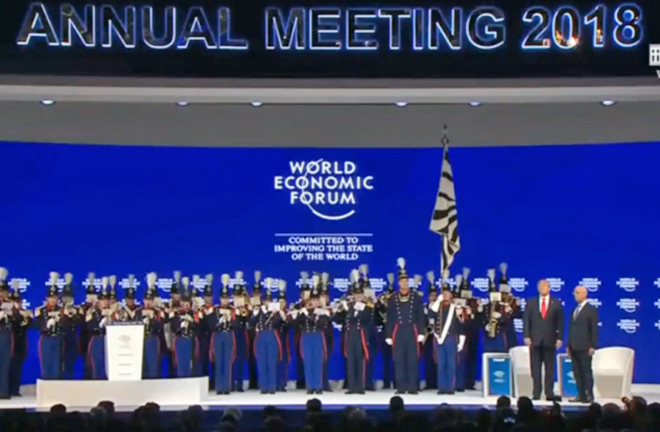Academics call for greater collaboration in fractured world

This year’s theme for the World Economic Forum is“Creating a Shared Future in a Fractured World.”
In a fractured world, it is all the more important to strengthen international cooperation and create a community of shared future—this growing global sentiment was reflected at the recently concluded 2018 annual meeting of the World Economic Forum.
Wang Yiwei, a professor from the School of International Studies at Renmin University of China, said fractures are emerging at three levels. At the global scale, as Western economies experience slow recovery from the global financial crisis, some have begun to prioritize the nation itself over others by adopting some favorable monetary policies and protectionism. Within Western societies, there has been growing differentiation, too. For instance, ever since the United Kingdom voted to leave the EU, there have been many uncertainties in Europe. There are also fractures within countries. In the wake of the sovereign debt crisis, some European countries like Spain have experienced political polarization combined with rising populism and nationalism, which threatens to hamstring further recovery of the global economy.
Some scholars have identified social polarization and political differentiation as the new features and challenges of Western societies. Sheng Bin, a professor from the Institute of International Economics at Nankai University, said that many Western nations have witnessed serious fractures among different classes, races and ethnic groups, and even among industries. “New industries, such as IT, finance, and science and technology are severely differentiated from traditional industries, and there is also a gap between the elitist mainstream media and the popular social networking platforms.” Differentiation of political standpoints and the widening income gap in Western societies have given rise to currents of hostility against globalization.
In the age of globalization, nations should not adopt isolationism. Rather, they need to understand and accept the transformation and develop flexible policy.
Wang said that China’s proposal to build a community of shared future for mankind transcends the state and nation and is concerned with the shared future from levels of economy and security, among others. Joint action is necessary to ensure a bright future for the world.
In his keynote speech at the World Economic Forum in 2017, Chinese President Xi Jinping advocated economic globalization. During the past year, China has continued to oppose protectionism while strengthening property protection. Promoting fair competition, China has relaxed access to its financial market and increased imports. In addition, China has been facilitating the “Belt and Road (B&R)” initiative.
Echoing Xi’s speech, this year’s theme for the World Economic Forum, “Creating a Shared Future in a Fractured World,” calls for strengthening international cooperation to address global risks.
Li Xiangyang, director of the National Institute of International Strategy at the Chinese Academy of Social Sciences, said that a community of shared future is not merely a metaphysical concept. Rather, it puts emphasis on coordinating rights and obligations. Highlighting a correct concept of righteousness and benefit, the “B&R” initiative proposed by China aims to integrate China’s national interests with those of the countries along the routes of the initiative as well as those of the international community. Unlike the nationalist policy of prioritizing national interest that some Western countries have pursued, a right concept of righteousness and benefit seeks positive externalities in the economic sense, i.e. to bring about mutually beneficial situations and spillover effects through collaboration. In contrast, adopting a nationalist policy or seeking benefits for one’s own nation at the expense of others will definitely trigger negative externalities, making a country more isolated, Li added.
(edited by JIANG HONG)
